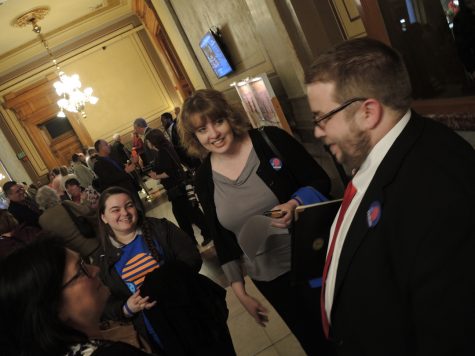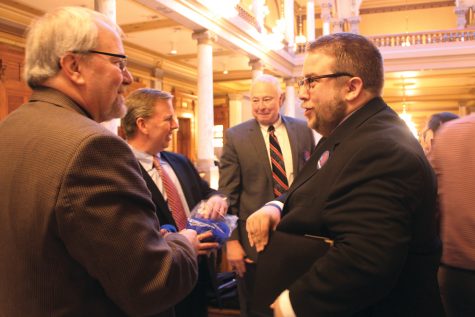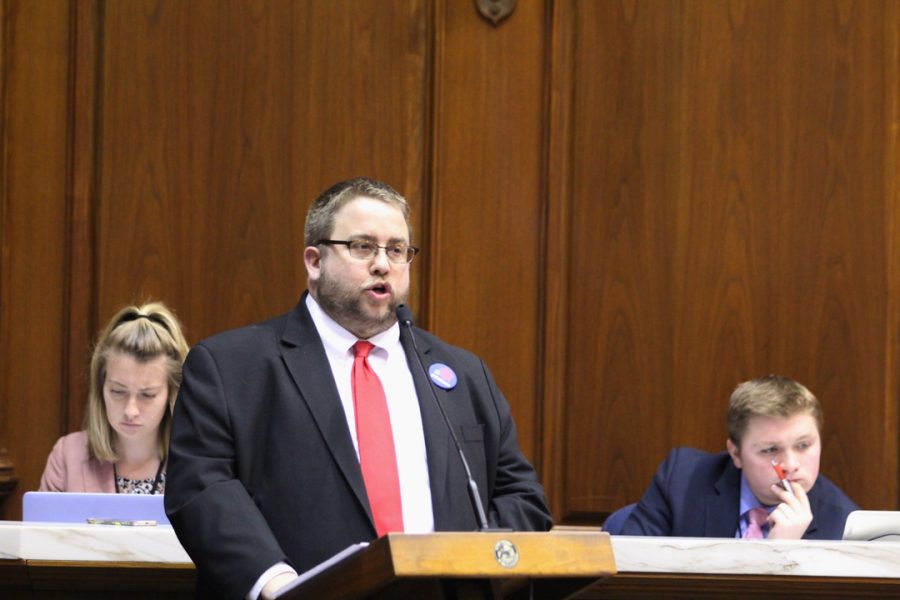The History of House Bill 1130
Adam Maksl testifies before the Indiana House of Representatives in support of House Bill 1130 on Feb. 15, 2017. Photo by Ruth Witmer, newsroom adviser at Indiana University.
March 22, 2017
An IU Southeast assistant professor was among others who testified before the Indiana State Senate on March 15.
Adam Maksl, assistant professor of journalism at IU Southeast, joined Diana Hadley, executive director of the High School Press Association, and Andrew Tapp, a student at Southport High School in Indianapolis, to testify on behalf of House Bill 1130.

House Bill 1130 protects students by providing “freedom of speech and freedom of press protections for grades 5 through 2 and state educational institution student journalists.”
The bill, which just passed the Indiana State Senate, is intended to protect high school and college journalists from interference from school administrators and allow them to research and report the news in their schools as decided by their own editorial staff. There is another reading of the bill in the Senate scheduled for March 27 which will also address the amendments.
The bill was introduced by Representative Ed Clere, R-New Albany, on Jan. 3. Clere reached out to Hadley, who was waging a grassroots campaign after an attempt to pass similar legislation in 1991 was defeated in the state Senate after associations representing state principals, school boards and superintendents opposed the bill.
Clere and Hadley, along with five high school students and five college students from across the state, met with professional administrative and teaching association representatives on Dec. 7, 2016, to discuss the bill and present their case.
House Bill 1130 unanimously passed in the House Education Committee on Feb. 16. Five days later, the Indiana House of Representatives voted 88-4 to pass the bill. Maksl also testified on behalf of the bill for the House.
Indiana joins a total of 17 state currently campaigning to guarantee freedom of press protections for high school and college students.
The states of California, Illinois, Maryland and North Dakota have laws in place protecting high school and college students.
Protections are in place for high school students in Arkansas, Colorado, Iowa, Kansas, Massachusetts and Pennsylvania.
The “anti-Hazelwood” laws are named after Hazelwood Sch. Dist. v. Kuhlmeier, a landmark United States Supreme Court decision from 1988.
In 1983, two newspaper articles in The Spectrum, the student newspaper of Hazelwood East High School in St. Louis, were written about teen pregnancy and the effects of divorce on students. When the teacher of the newspaper class presented the final proofs to the school principal, the principal objected to the articles and ordered they be withheld from the publication.
The former students sued the school district and school officials and the case went before the Supreme Court on Oct. 13, 1987. After hearing both sides of the case, the Supreme Court ruled on January 13, 1988 that First Amendment rights “are not automatically coextensive with the rights of adults in other settings, and must be applied in light of the special characteristics of the school environment.”
Ron Allman, professor of journalism at IU Southeast, said cases like Hazelwood Sch. Dist. v. Kuhlmeier and those like it are often cited in his ethics and introduction to mass communication classes. Allman said the case is the basis for a singular lesson in his ethics in journalism class.
Allman said he is also familiar with the nature of censorship at the college level.

“When I was adviser of The Horizon, we were pressured by the Student Activities Fees Committee when they took away $3,000 from our budget for printing something the then-chancellor didn’t like,” he said. “They said it was because of ‘bad stewardship of student money,’ but we made money so that excuse doesn’t make sense.”
Since the decision rendered in Hazelwood Sch. Dist. v. Kuhlmeier, other cases have risen to attempt to challenge the decision. Governors State University students Margaret Hosty, Jeni Porche and Steven Barba brought suit against the school after dean Patricia Carter refused to print an edition of the school’s paper, The Innovator. The dean wanted a school official to approve the newspaper’s contents before publication.
The students filed suit against the Illinois school in defense of their First Amendment rights. The federal district decided in favor of the students in the case of Hosty V. Carter on April 10, 2003. However, the Seventh Circuit federal appeals court overturned the decision on June 25, 2003, on the basis that, “there is no sharp difference between high school and college newspapers.”


